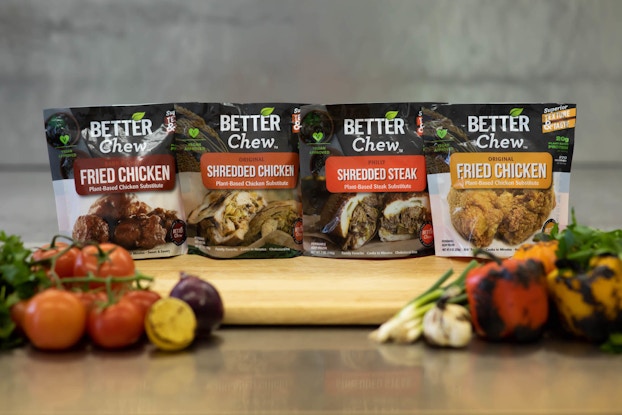
How one food startup landed big retail:
- GW “Chef” Chew, founder of Something Better Foods, paved the path to a national supermarket chain by first learning about the business of food, manufacturing and the consumer psyche as a restauranteur and via exposure to the best practices of mega grocery brands.
- The startup then built exposure for its Better Chew line of plant-based soul food at industry expos attended by retailers, eventually winning the attention of a Whole Foods’ buyer who signed on the brand.
- It has also tapped Community Development Financial Institution Funds (CDFIs), which are designed to spark economic opportunity in low-income and low-wealth communities, as a primary source of capital to grow the business.
GW “Chef” Chew, founder and CEO of Something Better Foods, was raised on “good eating soul food” in the rural, country town of Prince Frederick, Maryland.
A budding foodie before the term was a thing, Chew sopped up the Southern cooking culture of his childhood home “where I was always in the kitchen with Mom and Dad,” as they whipped up Black comfort-food classics like chitlins and pig’s feet, he told CO—.
That upbringing is baked into Better Chew, his line of plant-based versions of ethnic soul food dishes that in 2019, cracked 48 Whole Foods stores.
The business and its journey to big retail is a two-decade-long labor of love. Chew, informed by the notion that “what we eat can impact our health,” went vegan in 2001 at 18, when his life’s work started to crystalize: By building a business that replicates classic “Black cuisine” as vegan recipes, “I’m on a mission to democratize access to plant-based food proteins that can save lives, one chew at a time,” he said.
That vision includes bringing tasty and affordable vegan soul food to “food desserts” where healthy fare is hard to find. Something Better Foods is also inspired by the early deaths of Chew’s father and other family members from conditions such as diabetes and cancer — diseases that are disproportionately fatal to African Americans and communities of color, according to data from the U.S. Department of Health and Human Services Office of Minority Health.
[Read: Tech Powers ‘Food as Medicine’ Trend Amid Consumer Quest for Holistic Nutrition]
Getting on the grocery shelf: ‘Restaurants became my research and development labs’
Bit by both the cooking and entrepreneurial bugs at an early age, Chew started selling his homemade oat burgers house to house as a teenager. “I didn’t have a rulebook and wasn’t culinarily trained, but I wasn’t afraid to try something,” he said. That “spirit of curiosity” powered his vision for the business — as did the spirit of creativity, ingenuity and survival that’s foundational to the Black experience in America, including Black cuisine, he said. “Pig’s feet and chitlins and squirrel — we can make anything taste good,” he said.

Chew set out to do just that, but by using plant-based ingredients.
Before buzzy alternative meat startups Beyond Meat and Impossible Foods gained nationwide reach, Chew was experimenting with proteins from non-GMO organic soybeans and grains to mimic the texture of chicken and beef, as the vegan products on the market failed the good-taste test, he said.
Chew honed his vegan spin on Black cuisine and found a customer base for it in 2008, when his first restaurant bowed in Maryland. Two other vegan soul food eateries followed in California and Arkansas. “The restaurants became my research and development lab,” Chew said. “I was perfecting the recipe of my meat product all along the way. And after feeding thousands of customers, I had all this organic data to understand the psyche of customers, too,” he said.
At the same time, Better Food, the vegan comfort food spot he launched in 2012 in Northwest Arkansas, sat minutes from Walmart and Tyson Food’s headquarters. “It’s there I got exposed to the grocery industry, products and packaging on a really serious level and got all this education and mentoring on a practical level,” Chew said. It opened his eyes to selling the food already available in his restaurants to big retail, sparking the idea that, “Hey, I can get on the shelf.”
Chew began bringing his plant-based protein products to food expos like the Food Funded Investor Fair, where in 2018, he won first place in its pitch competition and caught the attention of a local forager/buyer from Whole Foods. The buyer bought into the brand, and its Better Chew line rolled out to 48 Whole Foods stores in Northern California the next year.
[Read: How 4 Buzzy Minority-Owned Startups Scored Funding Windfalls]

Building a Black-run manufacturing business via ‘socially conscious’ CDFI funds: ‘It’s about ownership’
Rather than outsourcing its food production, Something Better Foods supplies Whole Foods meals like plant-based shredded steak and fried chicken directly from the manufacturing facility it purchased with seed funding from Pacific Community Ventures and Working Solutions — Community Development Financial Institution Funds (CDFIs), which are designed to spark economic opportunity in low-income and low-wealth communities.
“They were very sympathetic to our mission,” he said. “The venture capital model isn’t the only way to invest. There are also socially conscious investors.”
That funding model has helped fuel the startup’s mission to both master food manufacturing and control its production pipeline.
“Black and Brown people don’t do a lot of manufacturing; we’re more consumers of goods,” Chew said.
“By becoming food scientists, food producers and food manufactures, we’re moving from a consuming mindset to a producing mindset” — one he plans to pay forward. “The knowledge I gain would be the generational education I could pass down,” he said.
For Chew, that goal is highly personal.
“My Dad was a sharecropper and got a degree in agriculture. When he bought his first piece of land, he would walk me around the property,” Chew recalled. “‘I own this land,’” his father would say. “That stayed with me.”
And while being acquired by a consumer products giant is many a startup’s dream, the scenario holds little appeal for Chew. “It’s hard for me, as a Black entrepreneur, to get the business to $50 million in revenue in five years, sell it and go live on the sand at the beach,” he said. “We’re focused on mastering the secrets of our business and a legacy of ownership and entrepreneurship,” he said, “which is so vital to our communities.”
CO— aims to bring you inspiration from leading respected experts. However, before making any business decision, you should consult a professional who can advise you based on your individual situation.
Follow us on Instagram for more expert tips & business owners’ stories.
CO—is committed to helping you start, run and grow your small business. Learn more about the benefits of small business membership in the U.S. Chamber of Commerce, here.
CO— Exclusives: Insider Strategies
How the buzziest brands and hottest startups are solving today's biggest business challenges. CO— brings you advice from startup founders and top executives for thriving in a new world.








